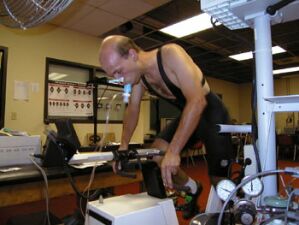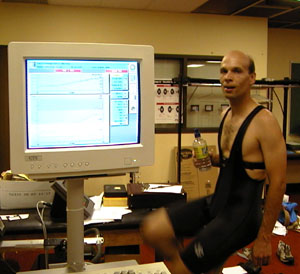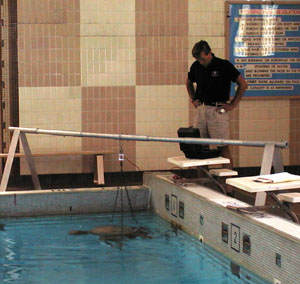Testing
July 19, 2000
VO2 Max
Maximal Oxygen Consumption testing, better known as VO2 max testing,
is one of the most popular tests for endurance athletes. As some skiers
compare Birkie times, many athletes compare VO2 max readings.
VO2 Max refers to the amount of oxygen your body can consume during
a maximal effort. This is measured in liters per minute per kilogram
of body weight. The air we breathe has a set amount of oxygen. By
analyzing the expired air for the remaining percentage of oxygen
one can calculate the amount being used by the athlete.
The test reflects how efficient your energy system is at supplying
oxygen to working muscles. While VO2 Max is primarily a genetic
factor, through training this can be increased, perhaps by as much
as 10-30 percent.
The Test
A number of people had told me that Park Nicollet was offering VO2
max testing here in the Cities. However, I've since found out that
Park Nicollet recently stopped doing testing for individuals. They
referred me to the University of St. Thomas and Dr. Daniel Carey.
I talked to Dan on the phone and set up a time to do a VO2 max test,
along with a hydrostatic weighing (for body fat).
Dan Carey is part of the Health and Human Performance Lab at St.
Thomas. Dan has been performing VO2 max testing for 8-9 years now,
although St. Thomas just recently opened their lab to the public.
Interestingly enough, Dan has previously been involved in testing
with NordicTrack, as well as the Breathe Right system.
The lab at St. Thomas has the equipment to allow an athlete to perform
the VO2 max testing on either a treadmill or bicycle machine. I'm
a fairly lousy runner and a fair cyclist, so I chose the cycle. Another
factor in favor of the cycle was that the equipment St. Thomas purchased
is not the normal 'upright' exercise cycle, but a more traditional
road bike layout. In fact, the bike is fully adjustable and you can
even bring your own pedals if so desired. It is electronically braked,
providing a smooth step up in levels during testing.
The VO2 max testing on the bicycle involves spinning the cranks
as progressively more load is applied. You breathe through a mouthpiece
tube that acts as a gas analyzer. Each minute, the load is increased
by 25 watts. The test lasts as long as you can keep cranking the
pedals at a reasonable rate, usually somewhere between 10-20 minutes.
 Early
on in the test, spinning is still very easy. Dan is checking
a heart rate reading. Early
on in the test, spinning is still very easy. Dan is checking
a heart rate reading. |
 OK,
the legs are starting to burn now! I stood for about the last
1-2 minutes of the test. OK,
the legs are starting to burn now! I stood for about the last
1-2 minutes of the test. |
 Spinning
down with an easy load after the test. Spinning
down with an easy load after the test. |
The biggest thing I noticed during the test was a dry throat.
With the mouthpiece, it's really not possible to swallow. However,
this didn't bother me that much. The one thing I really missed was
having brake hoods on the handlebars. I ride a lot with my hands
on the my brake hoods, especially when climbing, so it was a little
tricky trying to find a comfortable hold when standing.
Overall I found the testing to be fairly quick and not as exhausting
as I had expected. Dan sat down with me after he had processed all
the numbers and went through all the statistics and graphs, explaining
each in detail.
Hydrostatic Weighing
 After the VO2 max testing was completed, Dan took me down to the pool
for underwater weighing. Underwater weighing is one of the most accurate
methods for determining body fat percentage. The testing involves
climbing into the water and sitting on a small platform with your
head just out the water. To get a weighing, you need to dunk yourself
underwater, exhale all of the air you can out of your lungs and then
hold your breath for three seconds. They'll take three to five of
these weighings to get an average.
After the VO2 max testing was completed, Dan took me down to the pool
for underwater weighing. Underwater weighing is one of the most accurate
methods for determining body fat percentage. The testing involves
climbing into the water and sitting on a small platform with your
head just out the water. To get a weighing, you need to dunk yourself
underwater, exhale all of the air you can out of your lungs and then
hold your breath for three seconds. They'll take three to five of
these weighings to get an average.
The Results
| VO2 Max |
51.9 ml/kg/min |
| Anaerobic threshold (AT) VO2 |
43.3 ml/kg/min |
| AT % of VO2 Max |
83.8% |
| AT Heart rate |
184 |
| Max Heart rate during test |
194 |
| Body fat analysis |
12.6% |
As a comparision, Lance Armstrong has a VO2 max of 83.8, and Greg
Lemond had at one point recorded an astonishing 92. The highest
recording reading is supposedly 94, attributed to a nordic skier
(of course). Most females score about 10-15 ml lower.
I'm 35, weighing about 157 lbs, so I was pretty happy with these
results. I felt my muscles burned out before I really reached maximal
effort on the bike. Dan suggested that if I had done the test on
the treadmill, I might score as much as 7 ml higher. I've always
had a fairly high max heart rate (about 205 these days), but I was
surprised to see the AT threshold at 184. However, I was disappointed
with my body fat measurement, but know that I'm at least 5-7 pounds
over my usual ski season weight.
I'm planning to try the test again in February, hopefully at the
peak of the ski season and after I've lost a little more weight.
I'll use the treadmill the next time.
Notes
The lab at St. Thomas was undergoing some improvements, which involved
the temporary lack of air conditioning. They will have all the changes
completed by the time school starts again in the fall (September).
With the huge fan they have, I actually felt pretty cool the throughout
the test.
They are adding software to allow them to perform Wingate testing.
Wingate is an anaerobic power test performed on a bicycle. You basically
go all out for 30 seconds. You'll get back a reading on your peak
power output, as well as an average. The Wingate testing should
also be up and running by this September.
Contacts
The University of St. Thomas Health and Human Performance Lab is the
place where I had my VO2 max testing and hydrostatic weighing. The
testing was done on the St. Paul campus, in the Physical Education
building. Some details on this program:
Costs
| VO2 max test |
$60 |
| Hydrostatic weighing |
$20 |
| Wingate test |
$15 |
If you'd like more information or to set up an appointment, contact
Dan Carey at:
You can find maps for the St. Thomas campus on their web site:
http://www.stthomas.edu
Other Information
|



